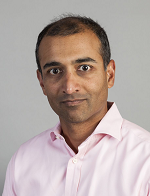By Ben Adams
 |
| Cambridge Epigenetix Chairman Bobby Yerramilli-Rao |
Cambridge Epigenetix raised $21 million in Series B funding with Google's ($GOOG) funding arm GV stumping up much of the cash--and announced a raft of changes at the top of its company.
The firm, abbreviated CEGX, develops epigenetic sequencing technologies and was founded in 2012 as a spinoff life sciences company from the University of Cambridge in England.
This latest funding round was led by GV (formerly Google Ventures), along with extra finance from Sequoia Capital and current investors New Science Ventures, the Wellcome Trust's Syncona Partners and Cambridge University.
Tom Hulme, GV general partner, will also join CEGX's board of directors, while co-founder Bobby Yerramilli-Rao will become its new chairman.
Meanwhile, the company has also appointed Geoff Smith as its new CEO. Smith joins CEGX from Illumina ($ILMN), where he was most recently the site lead and vice president of product development for the California gene sequencing firm.
This builds on the $5.5 million the firm raised in 2014 when it was run by former chief exec Fedja Bobanovic. He recently left CEGX to become the new vice president of the German-based life science manufacturer Leica Microsystems.
Cancer, autoimmune and neurological disorders can all be caused by abnormal epigenetic activity and may be helped by "turning off" related genes that are causing a disease. In fact some companies are already doing this, with Celgene ($CELG) leading the way with its blood cancer drug Vidaza and T-cell lymphoma treatment Istodax.
A recent report by Citigroup estimates that the epigenetic oncology market could be worth around $10 billion a year by 2025, and CEGX (as well as its backers) will be hoping to be taking a large chunk from this potential market.
Shankar Balasubramanian, who co-founded the venture, will also be aiming to replicate the success of his first company Solexa (now owned by Illumina)--which was founded in 1998 also as a university spinoff--to commercialize a quicker way to sequence DNA.
"CEGX is today ideally positioned to catalyze the market for epigenetics--just as Solexa and Illumina did for genomics a decade ago--and I am thrilled to have joined at such a transformational time for the company and in driving the next generation of epigenetics products," Smith said in a statement.
Yerramilli-Rao said: "CEGX's mission is to promote better health through continuous measurement of the epigenome. CEGX's novel technologies are allowing scientists to begin unlocking the tremendous potential of epigenetics."
CEGX is currently working on finding specific epigenetic tags that attach to the four chemical letters of the genetic code. The three most important tags--methyl, hydroxyethyl and formyl--are thought to be able to switch genes on or off in different circumstances.
Hulme added: "We've seen how the commercialization of genome sequencing has created incredible opportunities to improve human health, and now the epigenome holds similar potential. Cambridge Epigenetix is one of the few teams on the planet with the skills and experience to break new ground here, and we look forward to supporting them on that journey."
- read the release